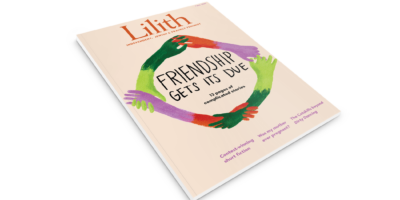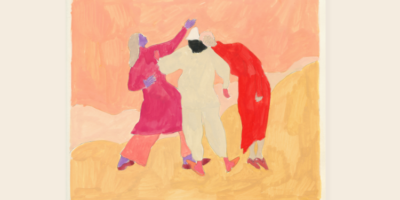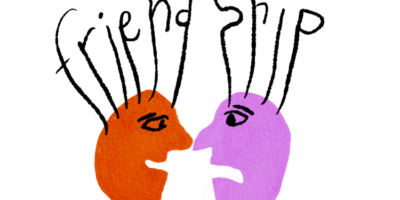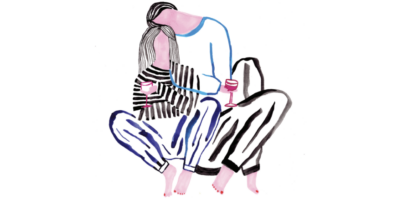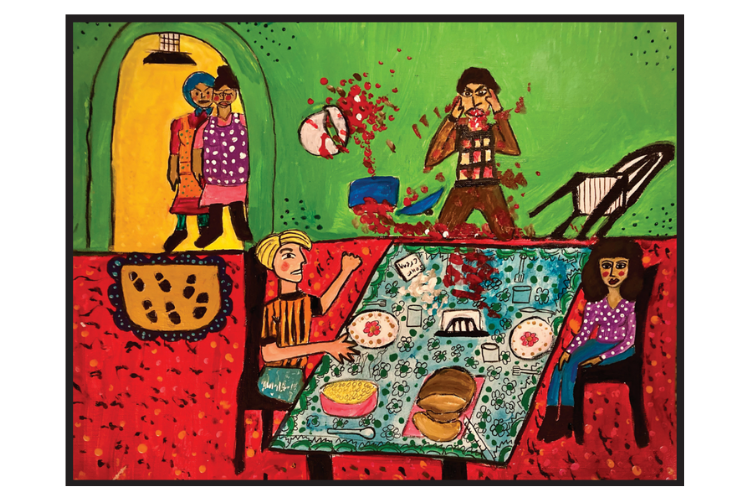
ART: JULIA SILVERBERG NÉMETH
At The Table of the Starved
There is an old, simple farmhouse full of memory. Its color is the fading blue of wilted cornflowers. The house is deep in the woods, in the mute land of the snow-covered North.
The inhabitants are immigrants; they live with the memory of war and revolution, and each evening they sit at the table of the starved.
The father screams as he waits for dinner to be served, his favorite fork in hand—a fork and a spoon from the military supply store. The fork has a loop at the end of the handle to hook to a belt.
The daughter is the youngest, silent and observing. She stares at the loop in his fork. She fears someday when the starving comes to the USA as it had in Magyarorszag, in Hungary, only her father will have a fork and a spoon; she knows he won’t share. The father’s voice shakes the daughter from her thoughts.
“We ate sparrows. Sparrows! Their black legs are still in my teeth,” he spits on the floor. “We stole moldy corn from the pigsty; you idiots think you have it hard. Don’t tell me about hard times. Where’s my dinner? That stupid useless woman, that cow, that whore.”
The daughter thinks of the sparrow. Its flesh holds secret knowledge. She will kill a sparrow in the spring when the songbirds return and eat it. Then she will know what it means to eat the sparrow.
Hunger overshadows all other needs. The father’s obsession with what is passed from mouth to anus is all-encompassing; he forces his obsession upon his wife and the children. They do everything for his inconsolable digestive tract—the barnyard full of animals, the gardens, the ten acres of potatoes each year.
There’s no time for anything but cooking, gardening, canning, fermenting, and butchering.
The family sits, except the mother, Mama; she never sits at the table. It’s the children, the daughter, the son, and the man of the house, the madman at the head of the table watching the clock, physically shaking with the emptiness of his bowels and of his soul.
Mama runs into the dining area, sweating like a servant, like a slave, with steaming pots and pans of delicious smelling food, csirke paprikás, nokedli, but she’s forgotten the sour cream. The father’s eyes dart back and forth in rage and anguish as he takes a helping.
Like a food critic from Hades, the children watch him crunching, slurping, and breathing through his food, oxygenating it for more flavor. He eats like a big cat. His pupils shake in a fury. He throws his plate against the wall. The deep red paprika flows down the green wall. “You stupid cow, too slow to bring
the sour cream.”
It was imperfect again—the food, not like before the war when everything tasted better. The father picks the csirke paprikás from his teeth and spits the black sparrow legs of his memories onto the floor full of food stains. The children try to eat dinner as their bellies turn and twist in distress. Then the father drops to his knees and wrings his hands; he pleads to G-d for food, for who knows what? Manna from heaven.
If the day finally arrives and the father eats the magical dinner from his past, the daughter hopes he dies at that moment, his face in the soup.
What more could he want? The daughter wonders. He has a barnyard full of animals, fecund fields and gardens, and even a servant, her mother, to fetch his dinner, make his bed, and even wash his feet each night. The daughter asks her mother why? How can she allow this madness, and most of all, how can she remain kind? Mama sheds a few tears and cryptically says, “I must.”
Mama tries to make everything good and make her daughter happy, so they go to the hiding place where Mama hides chocolate. Their favorite is Stover’s mint chocolate bar. Each day they eat only one bite.
“This is how we, the other girls, and I survived,” Mama says in a matter-of-fact tone, as though it was normal. “We never ate all our food at once.” Mama hugs her daughter. “Those who did this returned.”
Again, food, the daughter thinks and sighs. The thick chocolate feels like it’s choking her, but time with Mama, secret time, makes her feel special. The contradictions grow by the day, by the minute. Food is the enemy, food is violence by the father, food can help you survive a Nazi KZ, food must be rationed, and food is love from Mama. Food, food, food.
When the daughter becomes a teenager, she talks to her friends on the phone every evening; she listens to them talk about boys and parties. She does not tell them what it’s like at the dinner table, to sit at the table of the starved, her father’s creation, where shoals of sparrows join together in a murmuration of black memories. She doesn’t describe how her father flipped the entire table over and threatened divorce because her mother forgot to add salt to the meal.
No one hears nor wishes to hear when you talk of these things. The daughter has already learned. In the North, you make small talk, make yourself small, and get into the small ready-made box—that’s your destiny if you remain.
Mama cries in the kitchen over a stack of pots and pans—almost reaching the ceiling—Mama, poor Mama. She’ll wash the dishes until her hands are raw. She’ll get them good and clean, but she will never make her husband’s phantasm of a meal that existed before the war.
The daughter, an American, what does she know of actual suffering? Just the back of her father’s hand, to be chased with iron rods, axes, shovels, 2x4s, to be called nasty names: whore, piece of shit, stupid cow, useless, idiota.
In Hungarian, it’s even worse; the father curses his wife and children with plagues, wishes them to fall into seizures, calls them curva allat, and wishes for a horse’s cock inside them. Egy lo fusz a segedbe!
The stories from the Old Country are so intense the daughter is often confused that it was not she who ate the sparrow, not she deported to the camps and hiding crusts of bread. The generations run into each other, but with substantial missing parts, missing people. Her inheritance is a stain on her DNA that shows up in every part of her life.
In their simple farmhouse, she sits at the table of the starved day after day after day. As the years pass her father becomes a buffoon, not the frightening villain of her younger years.
Dulled by the years of his dinnertime antics, she and her brother continue eating, even as the father bursts into rages and walks on his knees through the remnants of the hot gulyás he threw to the ground. “Not enough caraway seeds, baszd meg, curva allat, hülye barum.”
He holds his stomach in pain; it has begun to bleed, to ulcerate. He chews charcoal pills that turn his lips black and Mylanta pills that turn his lips white. His children laugh behind his back. “Which lips will it be today?”
The children cram the food into their mouths— homemade bread, gulyás with cubed beef, carrots, potatoes, and rich, greasy broth. Their mouths are red with paprika, like the angry red left after a slap from their father’s hand, but it’s food; they take seconds and thirds. They grow fat. They stuff themselves but find they are still hungry like the father.
No one leaves the table of the starved satisfied—no one.
In a dream, the daughter sees her father turn into a puff of black smoke, then he emerges as a sparrow, flying into the walls. The family swats at it, making it bloody and lame; they chase it from the house, their lives, and their memories, but the sparrow lives on somewhere more profound, in their blood, in their genes, in every kitchen, at every table, in every bite. Every table they sit at is the table for the starved.
The daughter stops eating for three years. The sparrow and his thin insect-like legs are lodged in her throat. She becomes skin and bones, and her stomach bleeds and ulcers like the father’s.
And there is also the feeling of euphoria to be free of food finally.
The daughter has escaped the Northland. She lives in Los Angeles. She has a boyfriend, Tuvi, who is nothing like her father. He is a Jew born in Glasgow; he’s a good, sweet man who buys her gold heart pendants and ruby bracelets. Tuvi has tan skin and the most beautiful black, curly hair. He is the daughter’s dream of a man, the opposite of any in the Northland, where the people were cold, rosy-skinned strangers. Her brothers say Tuvi would pluck a star from the heavens for her if he could.
Still, he betrays her with his family, too—they conduct an intervention after discovering they can encompass her bicep between their thumb and fingers. There is a doctor friend there from the UK. He holds her thin arm up for everyone around the table to gaze at.
“Think of poor Tuvi; no man wants a skeleton for a wife.” The daughter also gazes at her thin arm, which looks like the sparrow’s leg—a thin, sickening limb darkened by the California sun. “Why not eat chocolate?”
The doctor lays down some sweets from England on the table. The daughter refuses. Mama has died in the meantime.
The idea of a single bite of chocolate makes her gag with grief.
At the clinic in Calabasas, a young man follows her, an orderly all in white, like in the movies. He tells her to be a good girl and eat her breakfast of gray porridge. Some of the other women scream and throw their porridge against the wall. One patient cuts herself with a spork. A shocking amount of blood spurts out. The orderly runs to help sedate and carry out the woman.
The daughter sits at the long cafeteria table. She thinks of her father. He threw food and screamed too. The starved, in her experience, often throw food. It’s counterintuitive were it not for the obvious trauma behind it. Now that she has eaten the sparrow, she feels pity even for her father. She throws her porridge into the trash and the others who have remained in the cafeteria race to do the same.
The sparrow in her throat hurts. The orderly rubs her arm and compliments her soft skin. Then he rubs her back and winks. “You’re cute, but no guy likes a girl with a boney spine. Don’t worry; we’ll get some lunch in ya today.”
The daughter has heard similar statements like this since she stopped eating. Men, they think eating or not eating is for them, about them. Except for Tuvi, he knew it was the war, the Shoah, and Mama’s death, yet he was the one who drove her to this place—a camp full of skeletons like Mama’s Belsen.
At night the nurses drug the daughter and the other women with high doses of Benzos. The over-friendly orderly visits the darkened rooms of his favorite patients. In the morning, the daughter thinks she’s had a bad dream, the sound of keys jangling, blurry images of the orderly, and memory of his heart racing and heat emanating from his mouth. Meanwhile, her body begins to talk louder and louder, then to scream within that she did not dream it.
For the first time, she wishes to be more like her father, scream, throw food, backhand the orderly, kill him, cut herself, and bleed out all the violations and sparrows. To drop to her knees in the hot porridge and plead with G-d for Manna, for holy nourishment.
The daughter tells everyone—her social worker, a trusted nurse, and other patients at the clinic what happened and what the orderly is doing. She’s warned to shut up, but she goes to the head psychiatrist of the clinic. When she arrives at his office, the orderly is there beside him. The daughter turns quickly to run, but two strong orderlies grab her, hold her down, and a nurse gives her a shot. When she wakes, she’s not sure what day it is. The door to her room is locked. It remains so for days.
When she’s finally released from her room, she calls Tuvi. She begs him to take her home. She tries to tell him what happened; she wants to scream but can’t find the strength to do so with the sparrow stuck in her throat and all the sedatives. It goes unsaid, just as her parent’s secrets went unsaid. The sparrow remains either way. It cannot be sedated, screamed away; it cannot be locked away in silence; it cannot be bled out; it cannot be smote by G-d, and most of all, it cannot be eaten or starved out.
For years, nearly a lifetime, the sparrow meets the daughter at the table of the starved each day. He perches on her shoulder. To call them old friends is an exaggeration, but they’re used to one another. The bird sings: starve, starve, starve, starve into her ear.
Then one day, when she’s a gray-haired woman, the sparrow’s song goes silent. It takes the woman a while to notice its absence. She sits with her daughter at a picnic table in the sunshine. The woman thinks her table is the table of the mended spirit. She’s proud and boasts of having stopped the cycle of trauma—the cycle of genocide. But soon, her daughter begins to say things only the sparrow knows—things only the Old Ones knew—the survivors of the ghettos, the death camps, the communist prisons.
Her daughter, the 3rd generation, builds a hiding place in their home and pretends she is Anne Frank, hoarding food, water, dolls, games, and books beneath her fort made of sheets. The woman watches hedaughter’s lips moving in a silent imaginary conversation. She can tell her daughter has the imprint of an insider of the Shoah.
The generations run into one another, smeared, a chemical mark, a stain that cannot be washed or even lived away. The experts say the trauma continues for at least five generations.
Near their picnic table in the sunshine, in the USA, far from its origin, the sparrow sits above the mother and the daughter on the electric wire; more join him, all singing their eternal song, the song that tears through the viscera like an insatiable hunger.
Julia Silverberg Németh received her MFA in Creative Writing from Mills College; she is currently writing a novel based upon her young-adult discovery that she is Jewish and that her mother was a Holocaust survivor.

